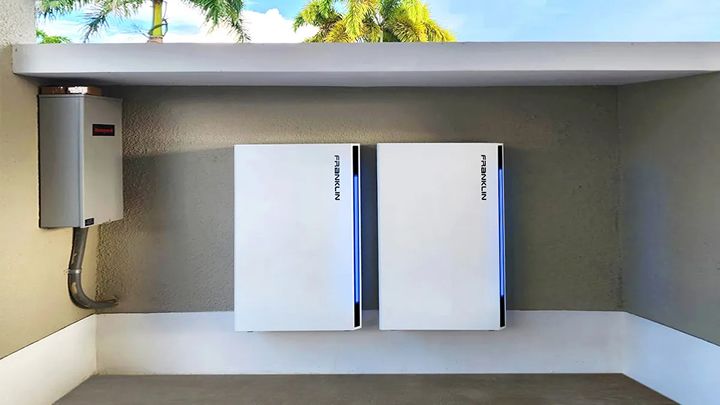Despite an uncertain economic landscape, Americans are prioritizing their access to consistent power, which is a clear sign that energy reliability has become a critical need.
 Utilizing Energy Storage and Renewables in Extreme Weather Events
Utilizing Energy Storage and Renewables in Extreme Weather Events

Q&A with Vincent Ambrose, Chief Commercial Officer at | FranklinWH
Tell us about yourself and your role with FranklinWH.
I’ve been immersed in the renewable energy industry for over 15 years, beginning with solar and finding my way into the budding energy storage space. I was drawn to renewables early on because I always thought the industry could do a better job of being more accessible to the average consumer. Though PV technology has existed since the 1950s, it only became affordable in recent years, and I’m excited to be a part of that revolution for additional technologies in the years ahead.
At FranklinWH, I work with an incredible team to drive commercial and operational development in North America. Our company only entered the U.S. market three years ago and has already become the third-most quoted residential battery provider in the country, and I can’t wait to see what growth we create in the future.
Are Americans growing more concerned about extreme weather and how it could impact their energy supply?
Unfortunately, Americans are very concerned about how extreme weather events, such as hurricanes, heat waves and tornadoes, may impact their livelihood. A recent FranklinWH survey of 1,000 Americans over the age of 18 found that 55 percent consider their location of residence to be at risk of extreme weather, and the impact of such events would be devastating to their day-to-day life.
In fact, a whopping 80 percent of respondents are concerned about extreme weather disrupting their power supply, and a power outage in the summer months would be a critical problem for 74 percent (the numbers are even higher for those in the south). Perhaps the most concerning statistic is that another 74 percent expect these events to become more frequent or damaging in the coming years, spelling trouble for citizens located in at-risk areas.
Do you see consumers willing to pay more in order to guarantee they are protected during an extreme weather event? Does it vary by geographic location?
Interestingly, we found that 72 percent would be willing to pay an additional fee on top of their monthly utility bills to ensure uninterrupted power supply when outages occur. Despite an uncertain economic landscape, Americans are prioritizing their access to consistent power, which is a clear sign that energy reliability has become a critical need.
The numbers are fairly similar across geographic locations, but unsurprisingly, 75 percent of Southern residents would be willing to pay such a fee. However, in the absence of such a program, we’re seeing consumers taking their energy needs into their own hands.
What steps are you seeing consumers taking to ensure their energy supply is secure and reliable?
One of the ways consumers are willing to work with their utility is through programs that incentivize them to reduce energy usage, with 75 percent expressing interest in this option. These types of programs are not available in every region, however, and do not actually provide protection in the event of an outage.
Another promising trend is the growing interest in battery energy storage systems (BESS), with 29 percent interested in investing in their home’s future energy needs. In the event of an outage, BESS paired with whole-home energy management systems can provide backup power to a homeowner’s most crucial loads, including the refrigerator, air conditioner and any important medical equipment.
Give us an idea on a potential energy setup a homeowner may consider that is wanting to have power during an extreme weather event.
To maintain power during an extreme weather event, there are two primary options for homeowners to choose from: whole-home generators or whole-home energy management systems powered by energy storage.
However, while whole-home generators can power a home immediately and last longer in a prolonged outage, they come with a host of other problems ranging from environmental impacts to noise and operating costs. In a prolonged outage, for example, acquiring additional fuel to power a generator can be a major problem.
Meanwhile, energy storage does not require any fuel and provides many most cost benefits to the homeowner (due to the ability to save on energy costs). The most important step for homeowners interested in batteries for home back-up is to work with their installer to understand how many batteries they’ll need to cover the home, as it can vary with larger residences.
What would you recommend to people that are interested in taking the next step on securing their energy needs?
One of the first steps homeowners should take is to understand their energy consumption patterns and rate. In addition to being more educated on annual utility bill price hikes and where they’re spending the most money, this will provide a starting point for optimizing your energy journey specific to the needs of your home.
In many cases, energy storage is an appealing solution for homeowners not only interested in becoming more resilient against external factors but saving money on energy costs as well. Consumers are willing to pay more for energy security, when in fact, whole-home energy management systems can provide this security in addition to cost benefits by taking advantage of utility pricing structures.
At the end of the day, pairing a PV system with energy storage is the most effective way for homeowners to generate and manage all of their energy needs. With upfront cost serving as one of the primary barriers to entry, interested parties should reach out to certified installers in their area to understand different financing options and what solution would work best for their home.
What new technologies do you see on the horizon as the demand for these products grows?
As demand for energy storage explodes in the next few years, one of the technologies becoming critical for homeowners is energy management controllers. By integrating energy sources including the energy grid, solar and generators, these controllers enable continuous energy supply while providing unparalleled control to the homeowners.
With smart circuits, for example, homeowners to manage their unique home loads through the convenience of a mobile app. This allows homeowners to identify and manage which loads require the most energy, when they are powered and to prioritize what energy sources are most important to them. By leveraging time of use (TOU) pricing options, homeowners can program when their battery is charging and when it is discharging to avoid paying for energy at peak times.
Additionally, vehicle to home (V2H) capability is becoming increasingly important as an additional energy source for homeowners. This allows the user to actually transfer energy from their EV to their residence when outages occur (or when demand and prices are high), which provides even more reliability and cost benefits.
Energy storage is certainly a major piece of the puzzle, but to fully realize its benefits, expect to see this type of technology become even more sophisticated and robust in the future.
 An impassioned advocate for renewable energy, Vincent Ambrose has a breadth of experience in sales, marketing and business operations with an in-depth specialty in renewable energy and sustainability. Prior to joining FranklinWH, Vincent led the North American Sales and Operations at Canadian Solar Inc., inclusive of over 5GW of annual solar components to the US, Canada, Mexico and Caribbean. He was responsible for the single largest sales contract in company history while managing full P&L responsibility for more than $1 billion annual revenue. A seasoned leader with an ability to execute complex transactions and pioneer unique solutions optimizing business to drive operational value, Vincent has over 25 years of senior management experience in management, sales, e-commerce, marketing and finance roles.
An impassioned advocate for renewable energy, Vincent Ambrose has a breadth of experience in sales, marketing and business operations with an in-depth specialty in renewable energy and sustainability. Prior to joining FranklinWH, Vincent led the North American Sales and Operations at Canadian Solar Inc., inclusive of over 5GW of annual solar components to the US, Canada, Mexico and Caribbean. He was responsible for the single largest sales contract in company history while managing full P&L responsibility for more than $1 billion annual revenue. A seasoned leader with an ability to execute complex transactions and pioneer unique solutions optimizing business to drive operational value, Vincent has over 25 years of senior management experience in management, sales, e-commerce, marketing and finance roles.
The content & opinions in this article are the author’s and do not necessarily represent the views of AltEnergyMag
Comments (0)
This post does not have any comments. Be the first to leave a comment below.
Featured Product

